Afghanistan: WHO reports surge in acute respiratory disease
According to the WHO report, more than 206,000 people were infected with respiratory diseases during this period, out of which 506 lost their lives.
The report argues, in essence, that the Biden Administration inherited the Doha deal with the Taliban from its predecessor, and it was left with the unenviable task of making the best of a bad job.

representational image/ US-Afghanistan flags (iStock photo)
The report released by the White House in April defending America’s withdrawal from Afghanistan has drawn flak from the usual quarters. Those arguing both against the USA’s pivot away from the region and the manner in which the Afghans were abandoned, have expectedly panned the 12-page summary of the report made public and the media briefing on it by the US National Security Council spokesperson.
The report argues, in essence, that the Biden Administration inherited the Doha deal with the Taliban from its predecessor, and it was left with the unenviable task of making the best of a bad job. The report implies that in terms of the withdrawal and evacuation of US forces from Afghanistan in August 2021 there was, in effect, no option. Critics such as Madiha Afzal have written that the report comes across as “defensive… and disingenuous” as it fails to address the US foreign policy debacle of 2021 substantively. Others have pointed out that the Doha deal was fundamentally flawed because it limited President Biden’s options; it gave the Taliban all it wanted – a date for the USA to leave Afghanistan – but got nothing more than counterterror promises in return even as it excluded the then democratically elected Afghan government from the process.
Advertisement
But what analysts on either side of the debate on the Afghanistan report seem to elide is the deep-seated and widespread aversion across America outside of the liberal coastal bastions to being involved in a foreign war. That is the reason for both President Trump’s hurried, badly negotiated deal as well as the embarrassing withdrawal from Afghanistan on Mr Biden’s watch. The unsuccessful 20-year American intervention in Afghanistan ~ which started as a retaliation for the 9/11 attack, morphed into a so-called nation building exercise, and eventually ended up in a shambles ~ has, however, resulted in a learning for the Washington establishment. As reflected in the US National Security Strategy published in late-2022, the American approach to troubled regions the world over will not be to barge in, as it were, but to support its regional allies and enable them to do the heavy lifting.
Advertisement
When it comes to dealing with complex regional issues, the realities are often far better understood by leading regional powers. But the problem with Afghanistan, in this context, was two-fold. First, in Pakistan, Washington had an ally that played both sides. Secondly, India refused to be drawn into the Afghan quagmire.
While there are calls in America for a deeper effort by the Biden Administration to examine the two-decade-long failure of the US effort in Afghanistan which included training the army, empowering law enforcement agencies, and ensuring at least a semblance of democracy, the harsh truth is that a surgical strike by special operations teams to take out the perpetrators of 9/11 and their closest allies would have served the American purpose of dismantling the terror infrastructure even if not wholly eradicating it. In the bargain, the region may have been spared its current instability.
Advertisement